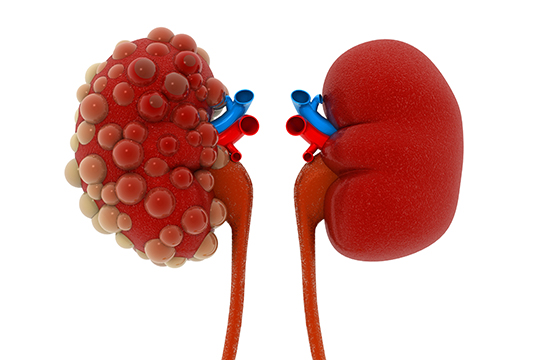Getting a better understanding of kidney disease
Freiburg, Mar 03, 2022
Worldwide, 10 to 15 percent of adults live with chronic kidney disease, and additional patients suffer from kidney cancer. These diseases often have genetic causes, but the underlying mechanisms are not yet sufficiently understood. The interdisciplinary team of the Collaborative Research Centre “Nephrogenetics (NephGen)” is dedicated to this task through various projects. Since January of 2021, the German Research Foundation (DFG) is funding the project with 13.5 million euros for the next four years. In addition to the University and the Medical Center – University of Freiburg, the Charité - Universitätsmedizin Berlin is also involved in the project. Franziska Becker spoke with the Spokesperson of NephGen, Prof. Dr. Anna Köttgen, Director of the Institute of Genetic Epidemiology at the Medical Center – University of Freiburg, about the role the kidney plays in human health.
 "It's difficult to select the optimal therapy for certain subtypes of kidney disease because they can't always be distinguished based on patients' symptoms," explains Anna Köttgen, who conducts research on kidney disease with an interdisciplinary team. Photo: Sandra Meyndt
"It's difficult to select the optimal therapy for certain subtypes of kidney disease because they can't always be distinguished based on patients' symptoms," explains Anna Köttgen, who conducts research on kidney disease with an interdisciplinary team. Photo: Sandra Meyndt
Ms. Köttgen, why do human beings require kidneys?
Anna Köttgen: Our two kidneys perform many vital functions. They filter our blood and ensure that we eliminate degradation and harmful substances while retaining important molecules in the body. They control water, salt and acid-base-balance and are involved in the regulation of blood pressure. In addition, they produce important hormones that influence blood cell formation or bone metabolism, for example.
Diseased kidneys can have a huge impact on health. What kind of research has already been conducted on kidney disease?
We already know a lot about kidney disease and about factors that increase the risk of kidney disease. For example, it is known that untreated diabetes can lead to damage to the kidney. Certain autoimmune diseases or infections can also attack the kidney. In recent years, it has also become increasingly clear to researchers that kidney disease in adults is much more likely to have a hereditary component than we previously thought.
Why is it so difficult to treat kidney disease?
For one thing, we often simply are not aware that a patient has kidney disease. It is often only discovered when more than half of the kidney function has already been lost. Thus, it is difficult to early on engage in drug therapy or lifestyle changes in order to preserve kidney function. Second, it is difficult to select the optimal therapy for certain subtypes of kidney disease because they cannot always be distinguished based on patients’ symptoms. And third, we do not yet know all the causes of kidney disease or understand the exact disease progression well enough to develop new therapies. For these reasons, we can often only treat the consequences of kidney disease, but not its causes.
 The kidneys fulfill vital tasks in the human body: they filter around 1,800 liters of blood every day and ensure that toxins are removed via the urine. Photo: Crystal light
The kidneys fulfill vital tasks in the human body: they filter around 1,800 liters of blood every day and ensure that toxins are removed via the urine. Photo: Crystal light
What aspect of kidney disease does the Collaborative Research Center “NephGen” address?
Since hereditary factors play an important role in kidney disease, we are conducting research on genetic kidney disease, which is why our Collaborative Research Centre is called “Nephrogenetics.” We hope that this will provide us with important insights into the development of kidney disease and the underlying mechanisms, in order to create the basis for better diagnostics and therapy. To this end, we examine the genetic material of patients with suspected genetic kidney disease using state-of-the-art methods, such as massively parallel sequencing of the entire genome. The changes discovered in this way can provide us with clues as to which molecule in the body is no longer functioning properly and could be the cause of the kidney disease. In a second step, we will then try to better understand the function of this molecule in the research laboratory. Ultimately, we want to create the basis for therapies that can compensate for the loss of the defective molecule or the affected mechanism.
What challenges do you face in your research?
Kidney disease is typically not painful at first. As a result, most patients do not even know that they have it. In addition, kidney function is very complex so cooperation between experts in many fields is essential. Fortunately, our Collaborative Research Centre makes it possible for us in Freiburg where kidney specialists, so-called nephrologists, work hand in hand with physicians from various other fields, biologists, computer scientists and many others. We are very happy and grateful for the support of the German Research Foundation.
The pandemic has probably made cooperation more difficult. How did your work at the Collaborative Research Centre get off to a good start in the first few months?
It has definitely been a pleasant surprise to see how well our joint work has progressed despite the difficult conditions during the pandemic. Although we are only at the beginning of the four-year funding of our research projects, important breakthroughs have already been achieved such as the discovery of new disease-causing genes and a new concept for the treatment of a common hereditary kidney disease, which is currently being studied in more detail in lab experiments.
Collaborative Research Centre 1453 Website
Prof. Dr. Anna Köttgen is the Director of the Institute of Genetic Epidemiology at the Medical Center - University of Freiburg. She is also a member of the Spemann Graduate School of Biology and Medicine, the Cluster of Excellence CIBSS, and the German National Academy of Sciences Leopoldina. In 2020, she received the State Research Award for Basic Research for her outstanding scientific achievements.

